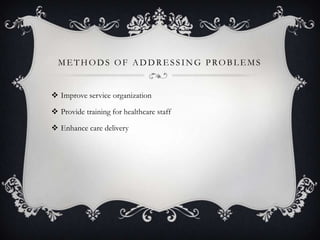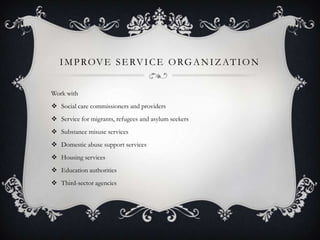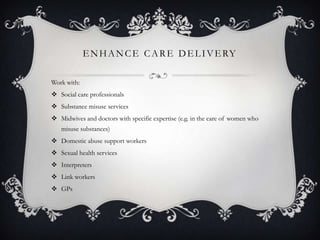Pregnant women and social factors
- 1. PREGNANCY AND COMPLEX SOCIAL FACTORS .
- 2. CATEGORIES OF PREGNANT WOMEN Women who misuse substances Women who are recent migrants, asylum seekers or refugee and who have difficulties reading or speaking English Young women aged under 20 Women who experience domestic abuse
- 3. AFFECTING COMPLEX SOCIAL FACTORS Some pregnant woman with complex social factors are discouraged from using antenatal care services. Overwhelmed by the involvement of multiple agencies Not familiar with antenatal care services Practical problems that make it difficult for them to attend antenatal appointments Finding hard to communicate with healthcare staff Anxious about the attitudes of healthcare staff
- 4. ME THODS OF ADDRE SSING PROBL E MS Improve service organization Provide training for healthcare staff Enhance care delivery
- 5. IMPROVE SERVICE ORGANIZATION Work with Social care commissioners and providers Service for migrants, refugees and asylum seekers Substance misuse services Domestic abuse support services Housing services Education authorities Third-sector agencies
- 6. RECOMMENDATIONS Tailor services to meet the needs of the local population • Maintain records for the no of woman presenting for antenatal care with complex social factors • Maintain records for each complex social factor grouping • Maintain records for attendance of appointments by no of woman in each complex social factor grouping Involve woman in their antenatal care • Record, monitor and use as guide the women’s response on satisfaction of services • Involve women and their families in determining local needs • Enable women to take a copy of their hand-held maternity notes when moving from one area or hospital to another
- 7. PROVIDE TRAINING FOR HEALTHCARE STAFF Work with Social care professionals
- 8. RE COMME NDATION Provide training on multi-agency needs assessment and information sharing
- 9. ENHANCE CARE DELIVERY Work with: Social care professionals Substance misuse services Midwives and doctors with specific expertise (e.g. in the care of women who misuse substances) Domestic abuse support workers Sexual health services Interpreters Link workers GPs
- 10. RE COMME NDATIONS Give information and offer referral at the first contact Reinforce contact at the booking appointment Coordinate care Communicate sensitively Keep the hand-held maternity notes up to date
- 11. RE COMME NDATIONS Offer referral to a substance misuse program Offer information and support Work with social care professionals to provide supportive and coordinated care
- 12. P R E G N A N T W O M E N W H O A R E R E C E N T M I G R A N T S , A S Y L U M S E E K E R S O R R E F U G E E S O R H AV E D I F F I C U L T Y I N R E A D I N G O R S P E A K I N G E N G L I S H Issues: May not make full use of antenatal care services Unfamiliarity with the health service Finding hard to communicate with healthcare staff Resolution: Use variety of means to communicate with women Telling women about antenatal care services and how to use them Undertaking training in the specific needs of women in these groups
- 13. RECOMMENDATION Adapt antenatal services to meet local needs Work with other agencies Allow enough time for interpretation Provide accessible information about pregnancy and how to find and use antenatal services in a variety of : • Formats such as posters, notices, leaflets, photgraphs, drawings/diagrams, online video clips, audio clips and DVDs, interactive educational module • Settings, including pharmacies, community centers, faith groups and centers, GP surgeries, family planning clinics, children’s centers, reception centers and hostels • Languages
- 14. TRAINING FOR HEALTHCARE STAFF Specific health needs of women such as needs arising from female genital mutilation or HIV Specific social, religious and psychological needs of women in these groups The most recent government policies on access and entitlement to care for recent migrants, asylum seekers and refugees
- 15. RECOMMENDATION Offer information on access and entitlement to healthcare Disscuss the importance of keeping her handheld maternity record with her at all times Avoid making assumptions based on woman’s culture, ethnic origin or religious beliefs Provide woman with interpreter who can communicate with her in her preferred language Ask the woman about her understanding of what she has been told to ensure she has understood it correctly
- 16. REFERENCE http://www.jhpiego.org/en/node/1191 (MCHIP) http://www.guardian.co.uk/global- development/video/2012/dec/05/female-genital-mutilation-women- video Molly Melching, founder of NGO Toshan http://www.guardian.co.uk/global- development/gallery/2013/feb/11/snapshots-suffering-survival-women- africa#/?picture=403732993&index=16 http://www.jhpiego.org/en/node/1191
Editor's Notes
- Discuss need for antenatal careOffer a booking appointment in the first trimester if she wants to keep pregnancy or referral to sexual health services if she is considering terminationGive a phone number to tell healthcare professional if her address changesGive her out-of-hours phone number, hospital triage contact, labour ward or birth centerInitiate a multi-agency needs assessment including safeguarding issuesRespect woman’s right to confidentiality and sensitively discuss her fears in a non-judgemental mannerTell her why and when information may need to be shared with other agenciesTo allow for discussion of sensitive issues, provide each woman with a one-to-one consultation, without partners, family members or legal guardians present, on at least one occasionMake sure the hand-held maternity notes contain a full record of care and the results of all antenatal tests.
- Named midwife or doctor should tell the woman about additional services such as drug and alcohol misuse support service and encourage her to use them according to her needsOffer information about the potential effects of substance misuse on her unborn baby and what to expect when the baby is born such as medical care the babay might need, where the baby will be cared for , any potential involvement of social servicesOffer information about help with transport to appointments if needed to support her attendanceUse a variety of methods to remind her about upcoming and missed appointmentsAddress the woman’s fears about involvement of children’s services and potential removal of her child by giving her information tailored to her needsAddress her feelings of guilt about her substance misuse and potential effects on her baby
- Monitor emergent local needs and plan and adjust services accordingly as they may not make full use of antenatal care services because of unfamiliarity with the health service or find it hard to communicate with healthcare staffWork with local agencies that provide housing and other services for recent migrants, asylum seekers and refugees to ensure the antenatal care services have accurate information about current address and contact detailsOffer flexibility on the number and length of appointmentsProvide information in a variety of :Formats such as posters, notices, leaflets, photographs, drawings/diagrams, online video clips, audio clips and DVDsLanguagesSettings including pharmacies, community centers, faith groups and centers, GP surgeries, family planning clinics, children’s centers, reception centers and hostels
















